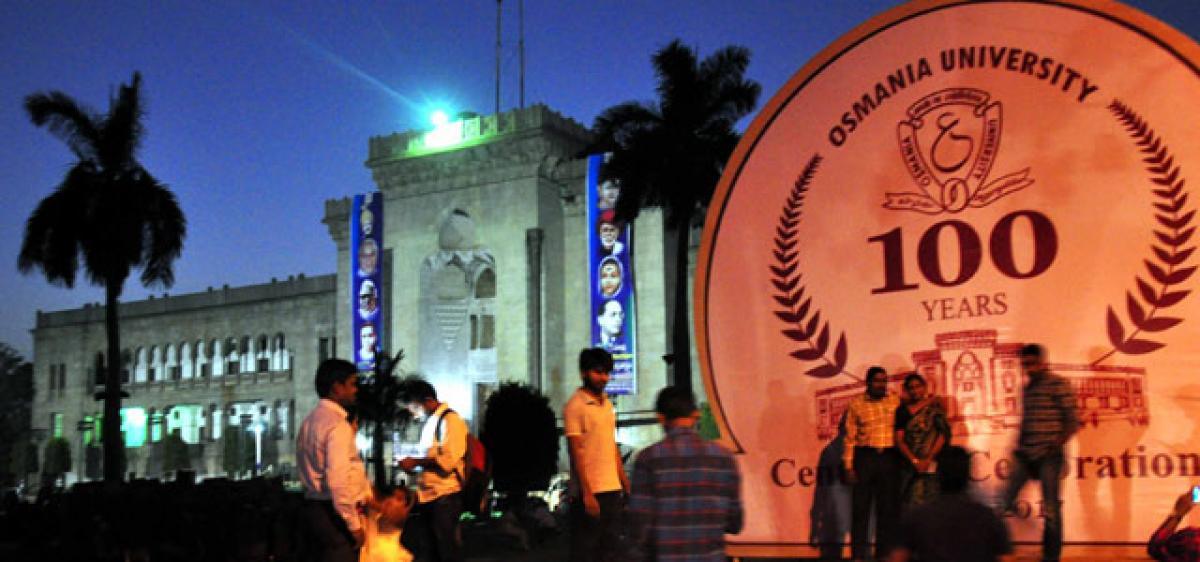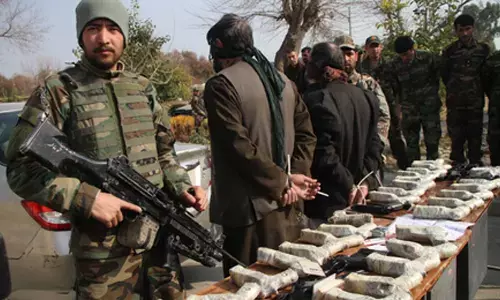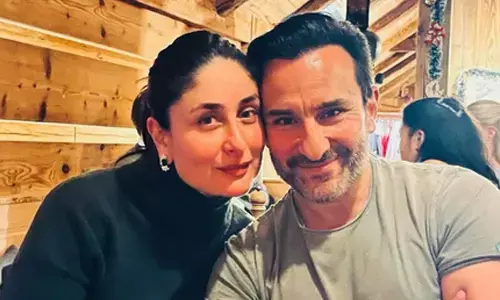Probing the relevance of a university

The Osmania University is celebrating its centenary today. It’s an apt moment to examine the social relevance of a university as the 100-year-old university is deeply embedded in the historical and social ethos of Telangana.
The Osmania University is celebrating its centenary today. It’s an apt moment to examine the social relevance of a university as the 100-year-old university is deeply embedded in the historical and social ethos of Telangana.
As the new state embarks upon reinventing itself, Telangana looks toward this premier varsity with hope and confidence. The products of this university shaped the destiny of not just Telangana but even the nation as a whole.
A UNESCO paper entitled, ‘Challenges of the university in the knowledge society,’ by Carlos Tünnermann Bernheim and Marilena de Souza Chaui states that one of the characteristics of contemporary society is the central role of knowledge in the production processes.
Most advanced economies are based on the greatest availability of knowledge. Comparative advantage is increasingly determined by the competitive use of knowledge and of technological innovations.
Universities have to develop as autonomous social institutions with a commitment to the lives of their societies. But, aims, objectives and methods of research are influenced by the universities of the West. The Indian universities have to come out of heteronomy.
Societies look towards solutions to the complex problems they face and the uncertainties they encounter. But, how far are the varsities prepared to assume this role? The academic community should make an honest introspection.
To assume this role, perhaps, the universities should undergo a transformation from their rigid positions of academic structures. The present-day academic studies are mostly discipline-centric, though knowledge is increasingly becoming inter-disciplinary. Therefore, the academic work in the universities should move away from being discipline-centric to problem-centric.
The knowledge is moving away from academic sphere and embracing entrepreneurial and industrial production spheres. This is the reason why there is an eminent disconnect between what the universities offer and what the work place demands.
As a result, universities are turning into centers that produce unemployables. A paradigm shift is, therefore, required to make the universities relevant to the contemporary economy, while performing their role as social critics that raise fundamental questions on the existing knowledge. Historically, universities are rooted in the tradition of non-conformism.
In the World Declaration on Higher Education, UNESCO states that there is “an increased awareness of higher education’s vital importance for socio-cultural and economic development, and for building the future… Owing to the scope and pace of change, society has become increasingly knowledge-based so that higher learning and research now act as essential components of cultural, socio-economic and environmentally sustainable development of individuals, communities and nations.”
The university academic community should actively participate in social, economic and cultural processes. But, this role has to be performed while preserving its scientific and intellectual rigor. The universities exercise intellectual authority over societies. They should exercise this function independently without becoming an appendage to the State apparatus. Universities, thus, are expected to perform this critical adversarial function.
The World Declaration on Higher Education states in turn that: “In economies characterized by changes and the emergence of new production paradigms based on knowledge and its applications, and on the handling of information, the links between higher education, the world of work and the other parts of society should be strengthened and renewed.”
The international debate on the relationship between university and society is increasingly defining its relevance in terms of how appropriately and effectively university responds to the demands of economy and business. There is no doubt that the university should meet these demands to enhance the employability of its products.
At the same time, the university should also address the challenges and demands the society presents to it. This function can be performed in three specific ways. The university should create a highly trained human resources, meeting the needs of a competitive society. It should undertake research questions that confront the society around it. Finally, it should establish mechanisms and instruments that enable the knowledge so generated to be disseminated to the society for appropriate application.
Society in all its diversity finds its due reflection in a university. Thus, the university is the microcosm of society. The ideas that conflict with each other in a society inevitably find their reflection at the varsity. Therefore, it‘s wrong to be unduly worried about the turbulence of ideas often associated with university spaces. Instead, the adventure of ideas without any violent manifestation needs to be promoted in a university.
The State cannot expect a university to be a cloistered place of learning. It cannot also be a mere operational university that trains specialists for the work market and mirrors a society viewing the market as the be-all and end-all of social living. The experience of vibrant universities worldwide indicates that those which aptly reflected the social dynamics produced men and women of high calibre.
The report of the University Education Commission headed by Dr S Radhakrishnan (1948), in Chapter II and Para 2 of Part I, stated: “Universities are the Organs of Civilization. He indeed must be blind who does not see that, mighty as are the political changes, far deeper are the fundamental questions which will be decided by what happens in the universities.
Everything is being brought to the test of reason, venerable theologies, ancient political institutions, time-honored social arrangements, a thousand things which a generation ago looked as fixed as the hills. If India is to confront the confusion of our time, she must turn for guidance, not to those who are lost in the mere exigencies of the passing hour, but to her men of letters, and men of science, to her poets and artists, to her discoverers and inventors. These intellectual pioneers of civilization are to be found and trained in the universities, which are the sanctuaries of the inner life of the nation.“
Thus, the university education should balance the needs of the productive sectors of the economy, the needs of the society in its entirety and that of the individual.
However, the societal imperatives on universities cannot make them oblivious to the needs of employment. Though, it‘s important to be firmly rooted in its own foundations, the universities cannot ignore the fact that the 21st century is defined by globalization of not just economy but even the knowledge. Therefore, the universities should prepare for both the local and the global work place between whom the distinction is increasingly being blurred.
The OECD studies reveal the characteristics of a modern day professional. Such a professional should be trained in a flexible curriculum, with cognitive and problem solving skills, ability to adapt to change to new technological processes, enormous creativity and a passion for a lifelong learning.
The academic atmosphere of the universities should rise up to this emerging profile of a global professional especially in the era of internationalisation of higher education.
Universities have to perceive knowledge as a social asset that can only be generated, transmitted, criticised and recreated for the benefit of society, in plural and free institutions that have full autonomy and academic freedom.
The manifesto of a university should, therefore, constitute the following: Make higher education universally accessible; promote sustainable development of the society; provide opportunities for lifelong learning; provide academic freedom and autonomy of mind; promote higher education relevant to the needs of the society; cater to the ever changing world of work; strengthen the whole edifice of education; promote a culture of inquiry and innovation; ensure social diversity; foster critical thinking; and function as an ethical compass for the society at large.
Observing the centenary of a university is not just a festivity. But, it’s celebration of autonomous mind, appreciation of its challenges, and rededication to society that nurtures it, coronation of knowledge and preservation of its universality.














